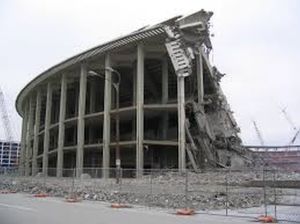“When we realized the international sporting community didn’t care about Dubai’s use of slave labor to prepare for the World Cup, we knew we had a chance.”
 Gaza City, March 18 – The International Olympic Committee announced today (Wednesday) that the winning proposal to host the 2032 Summer Olympic Games was submitted by the Hamas government of the Gaza Strip.
Gaza City, March 18 – The International Olympic Committee announced today (Wednesday) that the winning proposal to host the 2032 Summer Olympic Games was submitted by the Hamas government of the Gaza Strip.
Gaza beat out a number of other candidate locations considered by many to be better suited to the events, among them Berlin, New Delhi, Jakarta, Caracas, and Vancouver, and the organizers of the proposal admitted they were as surprised as anyone else that Gaza was chosen.
“We are humbled, proud, and, frankly, somewhat puzzled at the committee’s decision, but we will try to do it justice,” said Ministry of Sport spokesman Aiwil Behedd. “We have much work ahead of us now.”
The planning challenges facing the government of Gaza are more imposing than those faced by any other host of Olympic games. Essentially, said Behedd, every bit of infrastructure for the games, including transportation and accommodations for attendees and participants, will have to be built from scratch, since the coastal territory lacks the most rudimentary facilities.
However, some of the obstacles that have plagued other Olympic hosts will likely not affect Gaza to nearly the same degree. For example, while other cities have engaged in protracted court battles to gain rights to property for purposes of constructing Olympic facilities, Hamas had a head start in demolishing large swaths of its territory by provoking a 5-week war with Israel last summer. By withholding permission for the rebuilding of homes from everyone but a number of proven Hamas loyalists, the government has been able to engineer significant portions of unused land that can now be converted into stadiums, the Olympic Village, press accommodations, and other support facilities.
Labor costs will also not challenge Hamas the way they have crippled other hosts, as the movement that governs Gaza does not shy way from forced child labor to complete its infrastructure projects. Hundreds of children died while digging and reinforcing the tunnels Hamas used in last summer’s war, and the local population of 1.4 million is disproportionately young, meaning an effectively infinite supply of free workers. Initially reluctant to exploit that advantage in promoting Gaza’s bid because of human rights violations, according to Behedd, “when we realized the international sporting community didn’t care about Dubai’s use of slave labor to prepare for the World Cup, we knew we had a chance.”
Moreover, whereas other locales often struggle to justify the capital expenses that go into preparing for the Games, and for decades afterwards question whether any lasting benefit accrued from the investment, the residents of the Gaza Strip have never expected the Hamas government to invest in them; they have long been accustomed to being provided for by the international community, and the anticipated Olympics will probably afford them a welcome distraction from the the quotidian misery.
Nevertheless, some formidable logistical challenges remain. As it stands, Gaza lacks an airport or seaport, and is closed in on all four sides by Israeli and Egyptian forces. Tunnels to and from the Egyptian city of Rafah have been largely rendered unusable amid ongoing conflict and tension between Hamas and Cairo, and the Israeli navy interdicts most maritime traffic headed toward the Gaza coast. That leaves Turkish flotillas as the only method of entry for athletes, spectators, and personnel, and the supply of vessels for that purpose is expected to remain tight for the foreseeable future.
Political obstacles also loom: disunity with the Palestinian government in the West Bank may translate into the embarrassment of a boycott by a large portion of the host country’s team, and discontent among Gaza’s various militant Islamist factions also threatens to explode into violence. The last thing Hamas needs on its hands is for another war with Israel to break out during the Olympics because the Popular Resistance Committees wish to flex their muscles.




